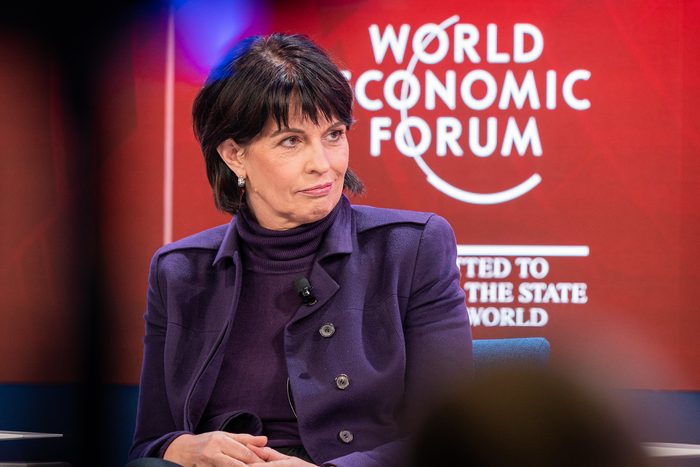Hi, this is Kasmira, and we’re covering the launch last night of a Swiss label to identify which online services users can trust.
In other news, Geneva will once again play host to US-Russia talks over Ukraine tensions this week – and should there be an international treaty on artificial intelligence? A podcast by think tank Foraus featuring experts from the University of Geneva tackles the question. |

|

Former Swiss federal councillor and chair of the Swiss Digital Initiative, Doris Leuthard speaking at the WEF annual meeting 2020 in Davos where the initiative was officially launched. (Credit: World Economic Forum / Manuel Lopez via Flickr)
|
|
Swiss initiative launches digital trust label.
Geneva-based foundation, the Swiss Digital Initiative (SDI), on Wednesday launched a label to help business customers and internet users identify which online services can be trusted. Its chair, former president Doris Leuthard, tells Geneva Solutions the standard will help provide users with “more transparency and security” in an increasingly tech-driven world. However, global take-up of the label is still far from guaranteed.
Geneva Solutions (EN)
|
|
Here's what else is happening
|
|
🎧 Podcast.
Can a computer own art? Does facial recognition defy human rights principles? What is the EU’s AI Act? Should there be an international treaty on artificial intelligence? Guest experts Alexandru Circiumaru, from the Ada Lovelace Institute, and Ana Andrijevic, from the Digital Law Center at the University of Geneva, discuss the challenges of regulating AI as countries try to play catch up with the rapidly evolving field in this podcast hosted by think tank Foraus.
Think Tank Hub (EN)
|
|
|
Science and diplomacy reads by GESDA
|
|

(Credit: Scitechdaily)
|
|
What is more risky?
Living in a world 2°C warmer with worsening natural disasters or exploring all the available technologies to try to reduce the amount of heat the atmosphere is trapping? One of these technologies is called solar radiation management (SRM) or solar geoengineering – and it is currently at the heart of a harsh debate.
It consists of “a theoretical set of approaches that seek to limit warming by deflecting more sunlight back into space. They would not be a substitute for cutting greenhouse gas emissions and removing excess CO2 from the atmosphere, but could potentially help reduce climate impacts and avert tipping points while the essential work of decarbonisation is completed,” explains Janos Pasztor, executive director of the Carnegie Climate Governance Initiative, in the recently published GESDA Science Breakthrough Radar.
Last year, scientists wanted to make a test-experiment above the high northern regions. But they were forced to stop it due to indigenous people who opposed the project. Far from the media, discussions have resumed around the possibility of relaunching such trials, as an article by the Thomson Reuters Foundation News nicely explains (read below). Not building systems to better understand the feasibility and viability of SRM “could deny future generations an option to reduce the impacts of soaring temperatures if SRM is found to be viable,” adds Janos Pasztor.
Many other initiatives have been launched. “One aim of the push is to have SRM discussed for the first time by the UN General Assembly, in September 2023,” writes Thomson Reuters, noting that “Switzerland also is considering submitting a resolution to the UN Environment Assembly, which is likely to meet in April, to seek UN-level consideration of climate altering technologies and measures (CATM)”.
On the other side, in a letter published on Monday, a group of scientists argues “against this increasing normalisation of solar geoengineering as a speculative part of the climate policy portfolio. We contend, in particular, that solar geoengineering at planetary scale is not governable in a globally inclusive and just manner within the current international political system. We therefore call upon governments and the UN to take immediate and effective political control over the development of solar geoengineering technologies”.
For Pasztor, “it’s already clear that SRM creates an unusually big and complicated governance challenge, which needs to be addressed”.
Let’s hope that identifying such a big and certainly important challenge won’t bring that whole research field to a full stop.
- Olivier Dessibourg, GESDA
|

This selection is proposed by the Geneva Science and Diplomacy Anticipator
GESDA, working on
anticipating cutting-edge science and technological advances to develop innovative and inclusive
solutions for the
benefit of the planet and its inhabitants.
|
|
GS news is a new media project covering the world of international cooperation and development. Don’t hesitate to forward our newsletter!
Have a good day!
|

|
|
Avenue du Bouchet 2
1209 Genève
Suisse
|
|
|
| |











